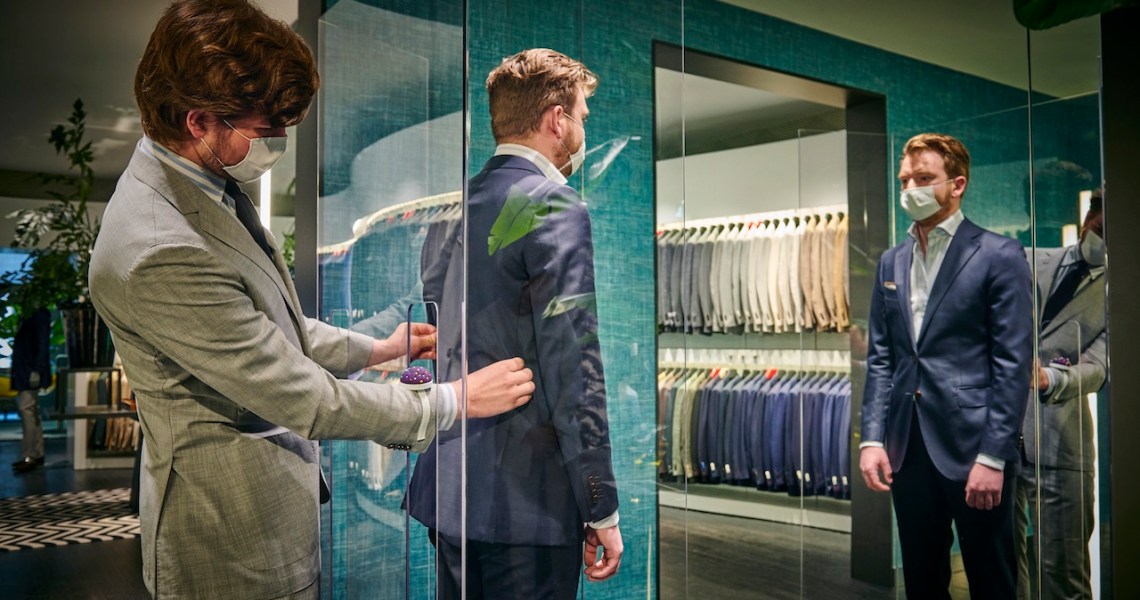The flurry of weddings happening throughout the second half of 2021 has been a boon for brands like Suitsupply, which rely on formal gatherings to drive sales. More than 50% of weddings planned for 2020 are being held in 2021, increasing demand on venues, amenities and retailers catering to weddings.
But canceled weddings starved formalwear brands for months. And now that weddings are back with a vengeance, those brands are facing a new challenge: getting enough inventory to meet the demand.
Fokke de Jong, CEO of Suitsupply, said the brand has seen shipping costs increase — in some cases, quadruple — and also delays in shipping, across the board. That’s similar to what many other brands have experienced. De Jong said that being part of trade organizations like the Fair Wear Foundation, which improve labor conditions in the fashion supply chain, have kept the company on good terms with its suppliers in Italy and manufacturers in China. In turn, those partners prioritized their orders throughout the pandemic, cutting down on delays. Suitsupply’s made $237 million last year, with more than half coming from U.S. customers.
Glossy spoke with de Jong about what other supply chain issues he’s seen and how Suitsupply is preparing for further challenges.
What kinds of supply chain issues have you run into?
“We’re seeing a lot of logistical costs [for international shipping and materials] going up. There are some impediments to moving things around, and the shipping costs increased significantly.
Our ready-to-wear clothes are shipped by sea and our custom clothes are shipped by air, so we’ve actually seen more delays with ready-to-wear rather than custom. Our delivery time is typically around 2-3 weeks, but over the summer it’s been 3-4 weeks — although that’s coming back down a bit now.
We don’t expect those prices to normalize for at least another year. They may even stay elevated for longer. The way I think of it is that all the pent-up demand now makes up for the lack of demand for so long. Logically, that demand will subside at some point, too. So the challenge now is temporary.”
Ad position: web_incontent_pos1
How has the wedding boom impacted the business?
“The wedding boom is very noticeable. It impacts our ready-to-wear and custom apparel differently, though. A lot of people are guests that need something quickly, which means they’ll gravitate toward the ready-to-wear. So we have to make sure we have inventory in stock for them. Others, especially the grooms, come weeks in advance to get a custom suit. We have more time to get what they need.
That’s why it’s been important for us not to close any of our retail stores, so customers can find the ready-to-wear they want. All of our [130] retail stores have remained open; we haven’t closed any of them permanently. And we’re expanding a lot of them — our Soho store, our Brooklyn store, our Madison Avenue store — and opening new stores. We have one in New Jersey opening next spring.”
Do you expect to be short on inventory at any time this year?
“Custom suits are not suffering any delays. We see more [delays] on the ready-to-wear side, which is sometimes more scarce with materials. We’re trying to build hedges where we can. We’ve been going throughout the supply chain, trying to buy more stock, more fabric and more patterns than we normally would from our suppliers. We are building a buffer, so that if, for example, a supplier shut down for three weeks, we’d have a [stash] of fabric we could use up until they open up again. We’re putting more money than usual into the supply chain right now. It’s less about efficient spending and more about just buying more than we need so that we have that buffer if there are any issues.”




